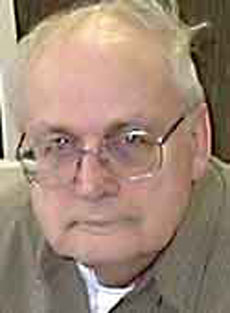Deep Throat search takes prof. to Texas

Troy Stanger
February 14, 2005
University professor Bill Gaines is receiving national attention for his continuing work of uncovering part of the mystery of the Watergate scandal.
Gaines and three of his students drove 17 hours to Texas last week to be among the first researchers to see the notes of journalists Carl Bernstein and Bob Woodward, the Washington Post reporters who uncovered the Watergate scandal in 1972.
His appearances on CNN, NBC Nightly News, CBS and several radio shows and newspapers have brought his conclusions about the identity of Woodward’s secret source, Deep Throat, back into the spotlight.
After sifting through the notes that were finally made public on Feb. 4, Gaines stands by his conclusion that Fred Fielding was the anonymous source used by the Washington Post to write articles eventually leading to former President Nixon’s resignation in 1974.
“I am absolutely confident that Fred Fielding is Deep Throat,” Gaines said. “There is nobody else who qualifies. Almost all the evidence, in some cases exclusively, points to Fred.”
Get The Daily Illini in your inbox!
Fred Fielding was the deputy counsel to former President Richard Nixon. He was appointed by President George W. Bush to the 9/11 Commission and is a senior partner at a law firm. Gaines and his class formally announced their accusation in April 2004 – Fielding, Woodward and Bernstein have declined to comment.
In an effort to confirm that Fielding is Deep Throat, Gaines and the students – Ann Sanner, John Hanson and Cathleen Conley – attended an exhibit of the Watergate notes at the University of Texas. The exhibit displayed some of the notes the university purchased from Woodward and Bernstein in the spring of 2003 for $5 million.
Gaines and the students arrived at the exhibit as soon as it opened at 9 a.m. They spent the next day and a half sorting through notes, memos and manuscripts to find any information that would help them confirm the identity of Deep Throat. The University of Texas allowed Gaines and his three students to make 10 pages of copies each, which they tried to utilize wisely. Many of the copies they made, which should arrive by the end of this week, were of margin notes Woodward and Bernstein made that Gaines will have his current class analyze.
But Gaines said his former students had already obtained most of the material that was made public.
“I don’t know if disappointed is the word, but it was very surprising there was very little new information,” Gaines said. Gaines and his students were hoping to see the raw notebooks Woodward and Bernstein used in their interviews, but these were not on display.
“A lot of the stuff they had wasn’t new to us,” said Sanner, senior in communications and Daily Illini employee.
Sanner hopes the copies they made will be helpful and that any single piece of evidence makes the trip worthwhile. This is just one of several trips Sanner has made for the class – Sanner has gone to Washington, D.C., three times in the past to find archived records that the class could use.
“One of the aspects of this class is that you are getting a real hands-on experience,” Sanner said. “You get to see how this part of history was made.”
Gaines has been investigating the identity of Deep Throat since the fall of 1999 with students who enroll in his investigative journalism class each semester. Gaines has thousands of pages of notes, manuscripts and memos in his office that his classes have found to help them with their investigation.
The investigation started out as a simple classroom project, but the public’s fascination with Watergate has caused Gaines and his class to be put in the spotlight as leaders in the Watergate investigation.
“I think he is the greatest living expert on Watergate other than Woodward and Bernstein,” said Conley, senior in LAS.
Gaines said he does not mind the attention from the press and shares the public’s fascination with Watergate. After he returned from the trip to Texas, Gaines was excited to find that the class’ Web site www.deepthroatuncovered.com received a surge of 40,000 individual hits in four days.
Gaines also has received a flurry of calls from newspapers, radios and broadcast stations after Feb. 7, when John Dean – a White House council during the Nixon administration – said Woodward told the Washington Post’s executive editor that Deep Throat is ill.
“The media has been taking up much of my time these days,” Gaines said. “It’s almost an incidence of mass hysteria that Deep Throat is dying.”
Gaines said he does not believe that Deep Throat is dying, and that the recent stories are based off of rumors.
Conley said Gaines and the students remain confident, even after the trip to Texas, that Fred Fielding is Deep Throat.
“Gaines and John Dean have a $100 bet that Fred Fielding is Deep Throat,” Conley said. “We’re definitely confident that he is.”






